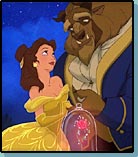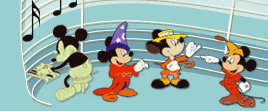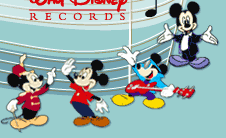1990s
 Another enhancement to the Disney audio label was the 1991 release "For Our Children," an all-star compilation of original and traditional children's music, to benefit the Pediatric AIDS Foundation. Contributing artists included Paul McCartney, Bruce Springsteen, Sting, Bob Dylan, Paula Abdul, and Elton John. The album went gold, and a check for $2 million was presented to the foundation.
The traditional success of Disney soundtracks, which was illustrated by "The Little Mermaid," continued with each successive release. The 1991 original soundtrack recording of Walt Disney Pictures' "Beauty and the Beast" shattered records previously held by "The Little Mermaid." The album was simultaneously certified gold and platinum immediately following the required 60-day eligibility period, a first for Disney. The title single, performed by Celine Dion and Peabo Bryson, was a No. 1 adult contemporary hit.
Menken and Ashman reteamed to create the music for "Beauty and the Beast," which garnered Grammy Awards for Best Song Written Specifically for a Motion Picture ("Beauty and the Beast"), Best Instrumental Composition Written for a Motion Picture or for Television, Best Album for Children, and Best Pop Vocal, Duo or Group (Celine Dion and Peabo Bryson, "Beauty and the Beast").
The original soundtrack of Walt Disney Pictures' "Aladdin," released in late 1992, achieved sales in excess of 3 million units. "Aladdin" won Oscars® for best score and best song ("A Whole New World"), as well as Grammy Awards for Song of the Year ("A Whole New World"), Best Song Written Specifically for a Motion Picture ("A Whole New World"), Best Instrumental Composition Written for a Motion Picture or for Television, Best Musical Album for Children, and Best Pop Performance by a Duo or Group with Vocal (Peabo Bryson and Regina Belle, "A Whole New World").
In 1994 Walt Disney Records released its first Broadway Original Cast Recording, "Disney's Beauty and the Beast: A New Musical." The record was nominated for a Grammy Award for Best Musical Show Album.
Walt Disney Records' first-ever Latin music compilation, "Navidad en Las Américas," was released in 1994 and rereleased during the 1996 holiday season. The recording features Spanish and English-language performances of traditional Latin and American Christmas songs. Plácido Domingo, José Feliciano, Tito Puente, Ricky Martin, and Xuxa are among the dozen artists featured.
Walt Disney Records also distributes more than 20 Spanish-language versions of classic Disney music albums and read-alongs, including the soundtracks to "El Jorobado de Notre Dame" ("The Hunchback of Notre Dame"), "Pocahontas," "La Bella y la Bestia" ("Beauty and the Beast"), and "La Sirenita" ("The Little Mermaid") and book and cassette read-alongs of favorites like "La Belle Durmiente" ("Sleeping Beauty") and "Blanca Nieves y los Siete Enanos" ("Snow White and the Seven Dwarfs").
Walt Disney Records has not forgotten the incredible library of music available at Disney. Releases that have mined the rich history of Disney have included the popular 1992 deluxe box set "The Music of Disney: A Legacy in Song," which was rereleased in limited quantities in 1996. Others include "The Sherman Brothers: Walt Disney's Supercalifragilistic Songwriting Team" (1992), "Annette: A Musical Reunion with America's Girl Next Door" (1993), and "The Music Behind the Magic: The Musical Artistry of Alan Menken, Howard Ashman, and Tim Rice" (1994). And 1995 saw the debut of the first two volumes of the new compilation series "Classic Disney: 60 Years of Musical Magic -- a collection of Disney's most popular music from its movies, TV shows, and theme parks." Both releases went gold, and the latest, Volume 3, was released in 1996.
The 1994 blockbuster "The Lion King" shattered Walt Disney Company records. The film has grossed more than 750 million dollars worldwide, and with sales in excess of 26 million units has become the best-selling home video in history. "The Lion King" original soundtrack recording was no exception to this roaring success -- the album spent nine consecutive weeks at No. 1 on the Billboard Top 200 and has sold more than 10 million albums.
"The Lion King" original soundtrack album was nominated for nine Grammy Awards, winning in the categories of Best Pop Vocal, Male (Elton John, "Can You Feel the Love Tonight"), Best Instrumental Arrangement with Vocals (Andrae Crouch, Lebo M, and Hans Zimmer, "The Circle of Life"), Best Musical Album for Children, and Best Spoken Word Album for Children for "The Lion King Read-Along." The music was nominated for four Academy Awards as well, including three nominations for original song ("Hakuna Matata," "Circle of Life," and the winner, "Can You Feel the Love Tonight") -- only the second time in Academy history that three songs have been nominated from one motion picture. At the American Music Awards, "The Lion King" soundtrack was honored with the Favorite Album, Pop/Rock prize. Finally, the Recording Industry Association of America ranked "The Lion King" the top album of 1994 for sales in excess of 7 million units.
The success of "The Lion King" inspired another inventive product extension, "Rhythm of the Pride Lands," a follow-up album of new songs evoking the African harmonies and rhythm of the smash film. Written by Grammy-winning South African composer/performer Lebo M, the album went platinum in sales and featured a top 15 adult contemporary single -- a special duet of "Hakuna Matata" performed by reggae legend Jimmy Cliff and Lebo M.
In 1995 Walt Disney Records supported the release of Walt Disney Pictures' 33rd animated feature, "Pocahontas," with an original soundtrack recording and storyteller products. Composer Alan Menken and lyricist Stephen Schwartz were honored with two Academy Awards -- Best Achievement in Music (Original Musical or Comedy Score) and Best Achievement in Music (Original Song) -- for their work on the project. The pair also garnered a Grammy Award for Best Musical Album for Children for the "Pocahontas Sing-Along." The soundtrack, which featured the top 10 hit "Colors of the Wind" performed by Vanessa Williams, went triple-platinum, breaking the preretail sales record established by "The Lion King."
Also in 1995 the label launched a new album series featuring contemporary artists performing both classic and all-new Disney music. The first such release, "The Music of Disney's Cinderella," includes performances by Linda Ronstadt, Bobby McFerrin, James Ingram, Take 6, David Sanborn, and David Benoit. These artists rerecorded the original "Cinderella" soundtrack, resulting in a timeless Disney classic with a contemporary twist. McFerrin's song was nominated for a Grammy Award in the category of Best Instrumental with Accompanying Vocals.
The second release from the contemporary artist series, "Take My Hand: Songs from the 100 Acre Wood," was nominated for a Grammy Award in the category of Best Musical Album for Children with appearances by the Chieftains, Tyler Collins, Kathie Lee Gifford, and Maureen McGovern. This gold-certified song album features a blend of all-new, original Winnie the Pooh songs with some old favorites, such as the Chieftains' Irish jig version of Pooh's ever-popular theme song.
In early 1996 the label continued with the contemporary artist series by releasing "Rock-a-Bye Baby," a collection of 13 "lullabized" pop tunes as performed by such well-known recording artists as Toni Childs, Karyn White, the Wild Colonials, Tyler Collins, and Lebo M. Later in the year, Walt Disney Records produced "The Best of Country Sing the Best of Disney," featuring such renowned country artists as George Jones, Kathy Mattea, Diamond Rio, Tanya Tucker, Collin Raye, and Pam Tillis.
Also in 1996 Menken and Schwartz rejoined forces to create the music for Disney's 34th full-length animated feature, "The Hunchback of Notre Dame." Featuring performances by Grammy Award-winning recording group All-4-One and the original diva, Bette Midler, the soundtrack weaves a rich musical tapestry with threads of adventure, romance, and humor.
1997 was an exciting year for Walt Disney Records, as the label released the soundtrack to "Hercules," Disney's 35th full-length animated film. The album featured music by Academy and Grammy Award-winning composer Alan Menken and Tony Award-winning lyricist David Zippel, who were nominated for a Golden Globe Award as songwriters for "Best Original Song from a Motion Picture" for the track "Go the Distance." 1997 also marked the launch of the label's Classic Soundtrack Series with the rerelease of digitally remastered original soundtracks to "Bambi," "Cinderella," "Sleeping Beauty," "Jungle Book," Dumbo," "and "Lady and the Tramp" for the first time ever in CD format. The label also made its third entry into the Broadway cast recording genre with the release of the critically acclaimed "The Lion King: Original Broadway Cast Recording," which won a Grammy for "Best Musical Show Album."
Walt Disney Records started 1998 with an unprecedented 25 of the top 25 spots on Billboard's "Top Kid Audio" chart for the week ending January 17, 1998. New releases for 1998 included a series of four new Winnie the Pooh audio products and the debut of a new series, Disney's Archive Collection, which includes material from the Golden Age of the label from popular artists like Louis Prima, Burl Ives, and Hayley Mills that has been unavailable for decades. Like the Classic Soundtrack Series, the Archive Collection has been digitally restored to the sonic brilliance of the original masters and is available on compact disc for the first time.
In the summer of 1998 the label released the soundtrack to Disney's 36th full-length animated feature, "Mulan." The soundtrack includes performances by pop group 98° with Stevie Wonder and a breakout performance by a then-17-year-old newcomer named Christina Aguilera. Songs from the film were composed by Grammy-nominated composer Matthew Wilder (producer of No Doubt's "Tragic Kingdom"), with lyrics by Tony Award-winning David Zippel (Disney's "Hercules") and score by the Jerry Goldsmith.
In 1998 Walt Disney Records also became part of The Buena Vista Music Group, headed by industry veteran Bob Cavallo. In addition to Walt Disney Records, The Buena Vista Music Group includes Buena Vista Records, Hollywood Records, Mammoth Records, Lyric Street Records, and Disney Music Publishing.
Walt Disney Records partnered with American Gramaphone in 1999 to release an adult contemporary album featuring the unique sound of Mannheim Steamroller interpreting classic Disney songs, entitled "Mannheim Steamroller Meets the Mouse." In the summer, Walt Disney Records swung into high gear with the soundtrack to "Tarzan®", featuring five new songs by Grammy award-winning singer/songwriter Phil Collins and score by composer Mark Mancina ("Speed," "Con Air," "Twister"). In fact, "Tarzan" was the best-selling soundtrack of 1999 and garnered many awards, winning a Grammy for "Best Soundtrack Album" and an Academy Award and Golden Globe for Best Song "You'll Be in My Heart."
| 

